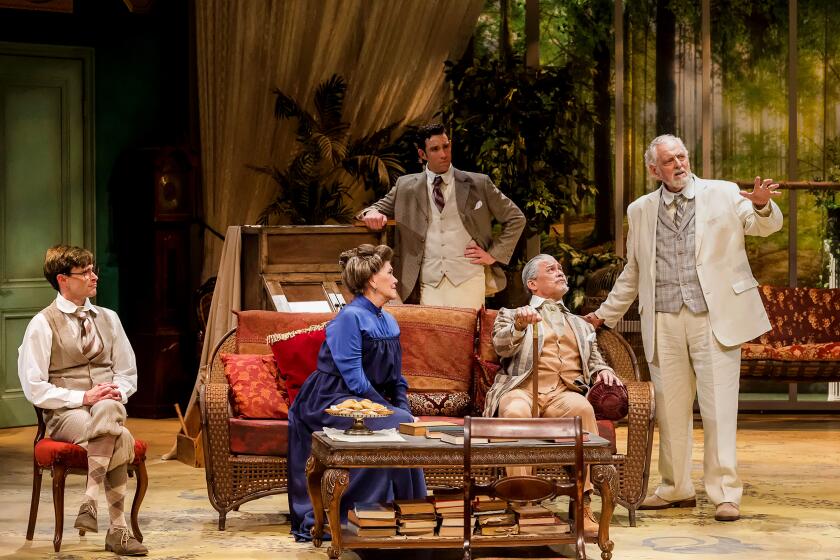CLASSICAL MUSIC / KENNETH HERMAN : Palomar Pianist Connects --With Audiences in Poland
Pianist Peter Gach of the Palomar College music faculty is also known as the Polish connection. In the early months of the spring semester, Gach spent eight weeks of his sabbatical in Poland, where he played recitals and renewed professional acquaintances that stemmed from his graduate studies at the Warsaw Conservatory 12 years ago.
Now, he is back in Poland on a more compact recital tour. This weekend he will perform in Warsaw and then participate in music festivals at two of Poland’s main musical shrines, Chopin’s birthplace and the summer residence of Karol Szymanowski. Gach’s recital program for this tour is appropriately divided between works by Chopin and a likely trio of American composers--Gershwin, Ives and Joplin.
Before he left to return to Warsaw, he shared some of his sabbatical observations about contemporary musical life in Poland.
“I encountered the same situation I left 12 years ago, only poorer,” said Gach. He noted that involvement in the arts is both an escape from the country’s dire economic conditions and a protest against the nation’s political repression.
“Classical music in Poland is not just another entertainment option, as it is here,” observed Gach. “The audiences there listen with an intense concentration and a level of attentiveness that the performer can feel. And the musical life in the major cities is very active.”
A recital he gave last February of Charles Ives’ First Sonata and three works by Southern California composers at Warsaw’s Chopin Music Academy was covered on television news.
“Prior to my recital, I was told that there would be news coverage. I did not realize, however, that right in the middle of my performance, the klieg lights would go on and the cameras would roll. That night on the television news, large portions of my recital were aired.”
Although the Poles are proud of their own musical heritage, they are sufficiently curious about American music to have requested Gach to devote half of his return recital to American composers. Aptly symbolic of these two traditions, Gach will give his recital at the Szymanowski Festival on the Fourth of July.
Down but Not Out. Although Kevin Kenner did not make the inner circle of six finalists in the Van Cliburn International Piano Competition, he is not taking time to indulge in self-pity and second thoughts. Instead, the young pianist from Coronado is preparing himself for yet another competition, the University of Maryland’s William Kapell Competition, which begins July 13.
“The first prize ($15,000) in the Kapell contest is the same as the Van Cliburn, although most people don’t realize that,” observed Kenner from Ft. Worth, where he was listening to the final rounds of the Van Cliburn Competition. He also noted that the Kapell Competition is not accompanied by a similar level of international attention. Should Kenner do well in the Maryland contest, it would be two in a row for San Diego pianists. Last year’s top player in the competition was former La Jolla pianist David Korevaar.
Kenner was the only American semifinalist in the quadrennial Van Cliburn Competition. When he learned in the early hours of last Thursday morning that he did not make the contest’s final cut, he confessed that he was filled with a kind of relief.
“I was really exhausted at that point,” he said, “and I was finding it difficult to concentrate on practicing the two concertos required for the final round.” Kenner had prepared the Chopin F Minor Piano Concerto and Tchaikovsky’s First Piano Concerto to perform with the Ft. Worth Symphony.
Reflecting on his overall performance in the Van Cliburn, Kenner sounded appropriately philosophical.
“I have the consolation of having been an audience favorite for both of my semifinal performances. Their standing ovations really made me feel wonderful. I was performing the music I wanted to play, and their response was a real boost in my self-esteem. I have no regrets about competing here.”
After speaking with some of the jurors after his semifinalist performances, Kenner decided not to take their rejection as a slight of his keyboard ability.
“The judges’ selection in a contest of this nature, where the level of performance is so high, really comes down to a matter of taste. Perhaps a different group of judges would have liked my Chopin interpretation. And, contrary to some of the press reports, I don’t think that politics had anything to do with the finalists’ selection.”
Kenner stated that the first thing he will do after the final ceremonies in Ft. Worth is return to Baltimore, where he will confer with his mentor, Leon Fleischer. After that debriefing, he will retreat to his parent’s Coronado home for a week of total recuperation, then gear up for the rigors of the Kapell Competition.
More Winners. It’s not exactly the Van Cliburn Competition, but San Diego’s own Musical Merit Foundation disburses about $15,000 every year to deserving young local musicians. Among the winners of this year’s competition held June 3 at San Diego State University: cellist Karen Freer won the $3,000 first prize; trumpeter Ryan Anthony took second prize of $2,500, and San Diego Symphony violist Karen Elaine won the $2,500 third prize. Michael Cox, Pine Valley’s most noted counter-tenor and one of the few singers specializing in that unusual voice category in Southern California--came in fourth place and was awarded $1,500.
More to Read
The biggest entertainment stories
Get our big stories about Hollywood, film, television, music, arts, culture and more right in your inbox as soon as they publish.
You may occasionally receive promotional content from the Los Angeles Times.






